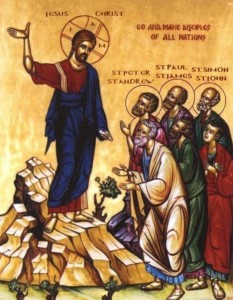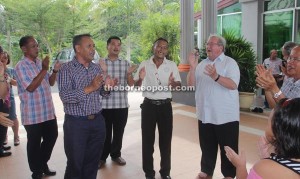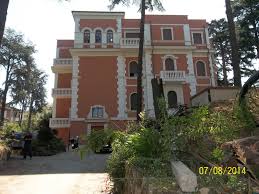“Go therefore and make disciples of all nations, baptizing them in the name of the Father and of the Son and of the Holy Spirit, and teaching them to obey everything that I have commanded you. And remember, I am with you always, to the end of the age.” [Matthew 18:19-20, NRSV]
[L] Go and make disciples of all nations. [M] Fr Sepp (fifth left) is seen here singing a hymn with friends before lunch. [R] House of the Mill Hill Missionaries, Rome.
At the conclusion of his Gospel, Matthew related Jesus’ message of the great commission. It is such a great and beautiful idea – to go and spread the Good News to the ends of the earth! Before his physical departure from this earth, the crucified and risen Christ, through this great commissioning, gave those who experienced intimate relationship with him a share of his mission. Experiencing intimate fellowship with God through Christ, we too are partners with him in his mission in and to the world. Indeed, our lives as Christians should be “sent” in worship to the King of kings, spreading out from our weekly gathering venues to extend God’s Kingdom worldwide.
Good ideas, however, are often spoken, sometimes even prominently, while rarely acted upon. This is certainly the case when it comes to the business of calling people into vocational ministry and the intentional discernment process required to respond to Christ’s great commissioning. Local churches, it is not difficult to see, are consistent in displaying a navel-gazing propensity, perpetually locked as they are into the mindset of a “receiving church”. They receive missionaries alright; but, absent from this mindset is a dogged determination to complete themselves as true churches of Christ in missionary endeavours, by becoming what all churches preaching the Kingdom-message of Jesus Christ are called to be – as both receiving and sending churches. In the mean time, taking pride in showing that they have “come of age”, they often insist on appointing locally ordained priests to the official positions of pastors of parish-churches, while relegating the missionary-clergy to the assistant status. Absent too, is a proportionate display of comprehension and action in the missionary nature by which all churches are defined – a definition of twin dimensions of receiving and sending. Churches exist for mission, not for their own sake. They are to receive in humility the generous gifts in the name of God, offered by other churches, and they benefit from the charisms the Spirit has distributed to those churches; but they are to also send in gratitude, in reciprocal return-gift, and in obedience to the Spirit’s call for generous sharing of their charisms for the common good of Christ’s Body.
It goes without saying that this missionary calling in Christian discipleship poses many questions. For some quick examples, how does the human heart move closer to God’s heart? Is an explicit faith in Jesus Christ as the Son of God absolutely necessary for “salvation”? What does “salvation” mean for human life on earth (that is, “existential salvation”), after death, and at the end of the world (that is, “eschatological salvation”)? How do we live out our calling to be “sent” in our community or halfway around the world? What comfortable things within our local church-life might actually threaten to obscure the greater things God is calling us to? How might we move from an ordinary and passive church membership to being an active missionary both within the local community and in foreign land? How do we grow from a perpetual receiving church into a sending church?
We do not expect to find these, and other related, questions fully answered in an interview report which was not tailored towards answering those questions. But the following report of an interview with a missionary priest does in part respond to some of these questions and, more importantly, offer some very interesting insights. This is a translated article by an Austrian lady, Julia Schneitter of Innsbruck, who gave the title as it appears on this post, and who felicitously sub-titled it “A meeting with the Mill Hill Missionary Fr. Sepp Schmӧlzer MHM”.
Fr. Josef Schmӧlzer MHM, from Austria, fondly known as “Fr. Sepp”, is a missionary rich in decades of experience working overseas. He served eleven years as a missionary priest in the Archdiocese of Kuching, Sarawak, Malaysia where we reside. Currently the Rector and Procurator General of the Mill Hill Missionaries in Rome, Fr. Sepp was recently back in Kuching for a visit, spending most of his time with the people of Bau whom he pastored during his eleven-year assignment in the 80’s. There was something special to Fr. Sepp’s latest visit, in that he was invited back to Sarawak by the people of Bau to be the principal celebrant in conjunction with the 130th anniversary celebrations of the building of the first church on Mount Singai by Fr. Felix Westerwoudt, a Mill Hill priest from the Netherlands. Today, the Catholic Memorial and Pilgrimage Centre [CMPC] up on Mount Singai, built under the tireless mobilization and able leadership of Fr. Sepp and co-workers [especially Vincent Eddy, to be further elaborated in the next post] enjoys fame and admiration from far and near.
Fr. Sepp’s interview by Julia Schneitter is reproduced below.
Heavy snow is falling from heaven and in a short time the fields of Leutasch are covered with a whiter blanket of snow even though it is springtime. Fr. Sepp Schmӧlzer, originally from Vals in Wipptal (Austria) and at present is parish priest of Leutasch, has just put a cup of hot coffee on the table and takes his seat opposite me. Snow and the cold are soon forgotten when he starts to tell about his experiences and adventures as a Missionary in Malaysia and in the Philippines.
Mission in the Kingdom of God
When I think about “mission” different things come to my mind. I asked Fr. Sepp what “mission” means to him. “Kingdom of God,” he answers simply. After a short pause he continues, “The Kingdom of God intends to change human relationships; this will happen slowly where people learn to love, to forgive and to be there for each other. To co-operate (with God) in the building of the Kingdom means to work and help people to free themselves from all sort of evil, in whatever form.” The Kingdom of God refers to the whole person in all aspects of life. It is not enough, if a missionary only builds a church to pray. Wherever we have built a church, very often you will find next to it a school and a clinic. “Kingdom of God” also means we want to promote “just structures, where all people are free and can develop’” and so free that they not only think of themselves but also of others. “Look, this is a good example,” says Fr. Sepp, and takes an envelope with pictures, “these arrived only yesterday.” The pictures show a building, a religious centre in the middle of a jungle. A big wooden stage gives an opportunity to celebrate with a large crowd. After heavy rains and winds huge jungle trees had fallen on the stage and have broken part of it. Already the community was busy collecting funds to rebuild it.
In a village nearby, there lived an old couple, not Christians. At about the same time their home was destroyed by fire. The couple was so poor. They would not have been able to rebuild their house. The catechist and some volunteers got together and decided to help this couple. They used some of the money collected for the repair of the centre and helped the couple. In a short time their house was rebuilt. Here I have seen myself that our Christians have understood the meaning of the Christian religion: that it is important to have a house of prayer, but the well-being of a human being takes the first place. If a person is in need, we have to help each other. And to see this attitude in our Christians in the mission today, I find this is a sign that they have understood what the “Good News”, our Gospel, are about.
“IS MISSION LIKE MISSION? everywhere the same?”
“You know what I find so exciting? Looking back I realize that I have gone through different stages of ‘Mission’ in my life.”
Fr. Sepp tells me of the time when he went out on the mission as a missionary from 1969-1971 as a teacher in co-operation with a development project of the Dutch Government in Malaysia (Sabah). He experienced that mission is not only preaching and baptizing, the spiritual side of our faith, but caring for the “whole being” of a person. This (school) project was meant help young students to develop the country materially, industrially, if you like. It was meant to animate people to help themselves. And it did work.
The second part of his missionary life he spent in Malaysia (Sarawak) from 1980 to 1991. His vision was: “Mission is God’s Kingdom”. “In our encounter with people of other religions and cultures we have to show respect and be attentive of their feelings.” In Malaysia it is a sign of respect and politeness to take off one’s shoes when you enter a house. Missionaries have to take off their “missionary shoes” in dealing with other cultures. It is easy to forget “that God was there (in their cultures) before the missionary came. My work was with local people, lay people, religious, catechists who were prepared to take responsibility for the Church in line with the proposals of Vatican Council II.
In the Philippines, his third place of work as a missionary, from 2002 – 2006, as Rector of a preparatory Seminary for Mill Hills Missionaries, Fr. Sepp was permitted to see how the seed of faith, sown by past generations of missionaries, has sprung up: there he experienced a vibrant church with many local customs. A church community which has become missionary oriented itself. These communities have understood: “to be a Christian means to be a missionary.” I said in admiration: “You have experienced in your own life the development of ‘missionary history’ in a small way.” “Indeed you are right”, said Fr. Sepp with a smile.
MAN (and WOMEN) A MYSTERY
There was still one question on my mind I had to ask. So I asked him straight away: “You have had many beautiful and enriching experiences. Were there moments when you reached the limits?”
“Indeed I had such moments,” said Fr. Sepp in a pensive way. “You know every person is and will remain a mystery. Even after I had learned the language and thought I had understood the culture after years … there still were surprises and disappointments.” One day he was doing his rounds of villages to be visited. He knew that the catechist had prepared a group of adults and parents for children baptism in this village. However, as Fr. Sepp had started the service he was told that on this day only the babies were to be baptized. The adults were due the next time. An adult candidate did not know that and came forward. When Fr. Sepp had to tell him that he was due at the next visit, he got very angry and stormed out of the church. He had “lost face” in front of the community. After Mass, the priest was told by a nervous catechist and community be would better leave quickly through a back exit of the village. The man had been seen with a bush knife. His daughter had not been able to stop him. Until evening Fr. Sepp with his catechist had found a safe place in the next village. “That night, I did not sleep well. I woke up so often from the noise of a cat jumping about the house or the shot by a hunter in the far distance. The situation in the village calmed down again and on the next visit the “too-eager-catechumen” was baptized with others.
FAMILY AND SPECK
Looking at the white meadow in front of the parish house I asked Fr. Sepp: “Did you ever miss home?” “Yes,” he said, “the family. “And some Austrian specialties like Speck,” he added after some thought. One day some friends from Austria came to visit him and they brought along a good bit of the smoked ham. “That was great, and what a great smell,” said Fr. Sepp, laughing.
Time had gone so fast. I thanked Fr. Sepp for his openness and readiness to share his experiences. As I went back to my car a thought came to my mind: had I met Fr. Sepp in the Maria Theresien Strasse (main street) of Innsbruck, I am not sure if I had noticed him among all the people, that this man speaks six languages, had experienced adventures that I only know from the cinema, and now at the age of 70 goes to Rome and starts once more to be in charge of the General Procure of the Mill Hill Missionaries.
How lucky that I met him!
[Translated by jgs 3 May 2015]
Copyright © Dr. Jeffrey & Angie Goh, July 2015. All rights reserved.
You are most welcome to respond to this post. Email your comments to jeffangiegoh@gmail.com. You can also be dialogue partners in this Ephphatha Coffee-Corner Ministry by sending us questions for discussion.



